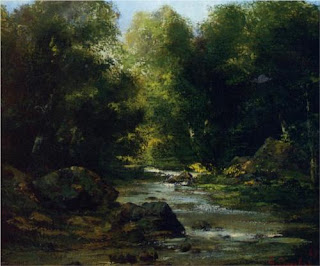I'd forgotten my camera and kind of cursed doing so and kind of tried to love the freedom you're supposed to have when you don't have a camera. The odd result was that I was louder: more exuberant in my praise of the rocks and moss and trees (fantastic exposed roots!), the
great name of the State Park, the belief in its healing fountains in the 19th and early 20th-centuries, and the effects of the sun on the water as it coursed in plentiful bursts through the ravine. These exultations proved supremely annoying to the kids who were, alternately, Lewis & Clark and a lawyer assessing the risks we were taking (the latter to mock me and my useless words of warning about climbing this that and everything). I was actually sympathetic to their plight: no one needs ebullience emanating from behind them at any given moment when they're hiking or being Lewis & Clark or being a risk lawyer. I tried to be less vocal, but I realized that my outbursts were also a response to a kind of frenetic energy that develops when I'm surrounded by unrelenting beauty and overwhelming well-being
in this moment (especially as
this moment exists in contrast to regular time, where the kids go back to school on Wednesday (indecent) and work is starting to pile up, all of it good, but all of the old anxieties, blah blah blah)
. A kind of Sublime Lite; and almost-awe; a not-quite transcendence. I continued in this frenetic and exuberant vein until Courbet came to me. A particular turn in the landscape, a blunt yet leading play of light, a flat patch of water - something conjured him up and all of a sudden I could see his landscape, could imagine him loving this place, seeking out its intricacies and what he might hold still. I felt myself relax into a focus, sort of delighted at the realization that images
could make me relax, and that they are a part of my hikes. That's a lot of mediation in the face of what should be direct access to the natural "world." Representing Nature is one of our cardinal sins against its force, some (
Tim Morton) have said. But representing Nature is one of the ways that I am
in it; mediating nature makes it more immediate. Why? Because I see more, I pay more attention to detail, I see the bigger picture, am involved in the dynamic of presence and representation when they are at their closest points of contact. Is that why landscapes were so fascinating to Courbet? Because the move from presence to representation was so quickly mediated that it became itself immediate? One thinks, too, of how awed the owner of the painting's family and friends stand before it. Of how much Courbet's painting could oscillate with the Real Thing for me today. I stopped pointing out what everyone could see. I focused. I felt the warmth of a kindred spirit. I learned from Lewis & Clark and the lawyer. And I was very present/really
there by thinking of representations, of things
over there, across the boundary/divide/thrill of images.

